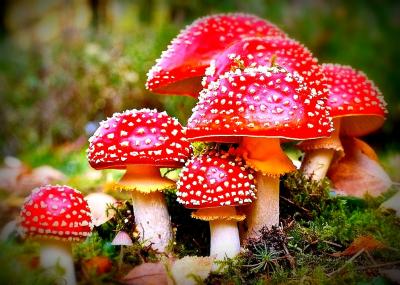

by Alexa Erickson, Collective Evolution
The term “recreational drug” gets a bad rap, and it’s understandable why. For instance, in modern history, few things have caused such a sharp uptick in U.S. deaths as drug overdoses. They kill more people than cars and guns. Crack cocaine, crystal meth, heroin, and fentanyl, for instance, are known for being deadly. Then there are drugs like weed, alcohol, and mushrooms, which certainly have less of a stigma — though only alcohol is legal nationwide.
Despite the fact that alcohol leads t0 more than 80,000 deaths annually in the U.S., it has been legal for decades and its consumption generally encouraged, particularly in the media. Weed, on the other hand, was outlawed nationwide for far too long despite mounting evidence that, used correctly, it presents significant medicinal value. The same can be said for hallucinogenic mushrooms.
According to the DEA, “Deaths exclusively from acute overdose of LSD, magic mushrooms, and mescaline are extremely rare. Deaths generally occur due to suicide, accidents, and dangerous behavior, or due to the person inadvertently eating poisonous plant material.”
This year’s Global Drug Survey further questions the official stance on psychedelics. While it would make sense that any drug deemed worthy of incarceration is unsafe, the survey found otherwise, reporting that mushrooms are the safest of all the drugs people take recreationally.
The survey found that, of the more than 12,000 people who reported taking psilocybin hallucinogenic mushrooms in 2016, a mere 0.2% reported needing emergency medical treatment. By comparison, that statistic increased at least fivefold for MDMA, LSD, and cocaine.
“Magic mushrooms are one of the safest drugs in the world,” explained Adam Winstock, a consultant addiction psychiatrist and founder of the Global Drug Survey. “Death from toxicity is almost unheard of with poisoning with more dangerous fungi being a much greater risk in terms of serious harms.”
The Global Drug Survey 2017, which included nearly 120,000 participants in 50 countries, is the world’s biggest annual drug survey. The questions cover types of substances taken, patterns of use, and negative effects.
For the 28,000 people who claimed to have taken magic mushrooms at some point in their lives, 81.7% said it was for a “moderate psychedelic experience” and the “enhancement of environment and social interactions.”
Winstock doesn’t want people to think magic mushrooms come without risk, however. “Combined use with alcohol and use within risky or unfamiliar settings increase the risks of harm most commonly accidental injury, panic and short lived confusion, disorientation and fears of losing one’s mind.,” he said.
And other than for recreational use, research has shown magic mushrooms to be beneficial in treating severe depression and anxiety.
The 2017 GSD survey also found that, of the almost 10,000 people who took LSD, 1% of them reported seeking emergency medical treatment — five times more than those who took magic mushrooms.
“LSD is such a potent drug,” said Winstock, who notes that drug manufacturers have begun to include novel super potent psychedelics like NBOMe into tabs, which adds to the risk. “It’s so difficult to dose accurately when tabs you buy vary so widely. It’s easy to take too much and have an experience beyond the one you were expecting.”
The survey found synthetic cannabis to be among the riskiest of drugs, with over one in 30 users seeking emergency medical treatment. This is the highest of the drugs studied except for crystal meth.
Brad Burge from the Multidisciplinary Association for Psychedelic Studies (Maps) points out the potential misstep in the survey, since people involved in the self reports could have taken multiple drugs at the same time, making it hard to pinpoint which one causes their reported problem.
Both Winstock and Burge noted that the 2017 survey indicates a need for drug policy reform.
“Drug laws need to balance the positives and problems they can create in society and well crafted laws should nudge people to find the right balance for themselves,” said Winstock.
“People don’t tend to abuse psychedelics, they don’t get dependent, they don’t rot every organ from head to toe, and many would cite their impact upon their life as profound and positive. But you need to know how to use them.”

